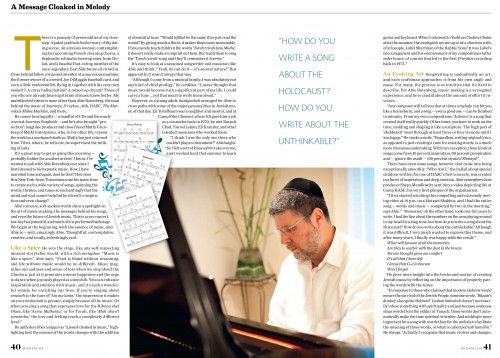In this weeks Mishpacha Magazine: A Message Cloaked In MELODY – The Music of Abie Rotenberg
by yossi | January 4, 2012 9:35 am
In this weeks Mishpacha Magazine there is an amazing interview with Abie Rotenberg. You can read part of the interview below.
When the first Journeys album debuted, it was something entirely new: heartfelt music set to original English lyrics, in a language and style that felt current and American but still eminently Jewish to thousands of fans. That secret formula marks just about every melody created by Abie Rotenberg — from kiddie fare to kumzitz classics. In a memorably candid conversation, Abie shares the inspiration that sparked years of compositions
by Riva Pomerantz
PHOTOS Shira Breiner, Ouria Tadmor
There is a panoply of personalities at my doorstep. A jaded yeshivah bochur wary of the dating scene, an anxious woman contemplating her upcoming Pesach cleaning chores, a Sephardic schmaltz-herring eater from Holon, and a baseball bat–toting member of the once-legendary East Side bums all crowd in. Close behind follow a wizened inventor of a marvelous machine, the former owner of a coveted Joe DiMaggio baseball card, and even a little neshamah’leh, flying in together with his very own malach’l. A crazy hallucination? A mixed-up dream? Those of you who are already hearing strains of music know better. My multifaceted visitor is none other than Abie Rotenberg, the man behind the music of Journeys, D’veykus, Aish, HASC, The Marvelous Midos Machine, and more.
He comes bearing gifts — a handful of CDs and the muchcoveted Journeys Songbook — and he’s also brought “protection”: longtime producer and close friend Mutty Grunberg of M&M Enterprises, who, in his other life, travels the world as a mashgiach kashrus. Mutty has just returned from Tibet, where, he tells me, he supervised the milking of yaks.
It’s a great way to get us going this morning — probably fodder for another article! I know I’ve wanted to yak with Abie Rotenberg ever since I first listened to his hypnotic music. How, I have marveled time and again, does he do it? How does this New York–born Torontonian use his spare time to create such a wide variety of songs, spinning the words, themes, and tunes so enchantingly that the mind and soul cannot help but be stirred to inspiration and even change?
Abie’s sincere, soft-spoken words shine a spotlight on the art of music-making, the messages behind his songs, and even the future of Jewish music. This is a rare concert, low-key but powerful, and much of it is performed backstage. We begin at the beginning, with the essence of music, and Abie is — well, amazingly Abie. Thoughtful, contemplative, creative, and totally, refreshingly real.
Like a Spice He sets the stage, like any self-respecting musical storyteller would, with a rich metaphor. “Music is like a spice,” Abie says. “Food is bland without seasoning, and life without music would be no different. Music magnifies our sadness and sense of loss when we sing about the Churban, just as it generates intense happiness and the urge to dance when joyously played at a simchah. You can enhance inspiration and emotion with music, and it’s such a wonderful vehicle for enriching our lives. If you’re singing about emunah to the tune of ‘Ani ma’amin,’ the impression it makes on your neshamah is greater, simply because of the music. Or when you sing a song that expresses love for the Ribono shel Olam, like ‘Avinu Malkeinu,’ or for Torah, like ‘Mah ahavti
sorasecha,’ the love and feeling reach a completely different level.”
He aptly describes a niggun as “a pasuk cloaked in music,” highlighting how the essence of the words changes with the addition of a beautiful tune. “Would tefillah be the same if we just read the
words? By giving words a flavor, it makes them more memorable. If you merely teach children the words ‘Torah tzivah lanu Moshe,’ it doesn’t really make an imprint on them. But teach them to sing
the ‘Torah tzivah’ song and they’ll remember it forever.”
It’s easy to look at a seasoned songwriter and musician like Abie and think, “Yeah, he can do it — it’s second nature!” But apparently, it wasn’t always that way.
“Although I come from a musical family, I was absolutely not any kind of child prodigy,” he confides. “I never thought that music would become such a significant part of my life. I could carry a tune … not that much to write home about.”
However, as a young adult, hashgachah arranged for Abie to cross paths with some of the major personalities in Jewish music of that day. Eli Teitelbaum was a neighbor and mentor, and at
Camp S’dei Chemed, where Eli gave him a job as a counselor back in 1970, he met Baruch Chait, Yisroel Lamm, Eli Kranzler, and other talented musicians who worked there.
“I think I was the only one there who couldn’t play an instrument!” Abie laughs. “So I felt a sort of kinas sofrim take over me, and I worked hard that summer to learn…
 [1]
[1]
To read the rest of the article please visit your newsstands to pick up this weeks issue of Mishpacha Magazine or visit Mishpacha.com.
- [Image]: http://www.thejewishinsights.com/wp/weeks-mishpacha-magazine-message-cloaked-melody-music-abie-rotenberg/abie-rottenbeg-2b/
Source URL: https://www.thejewishinsights.com/wp/weeks-mishpacha-magazine-message-cloaked-melody-music-abie-rotenberg/